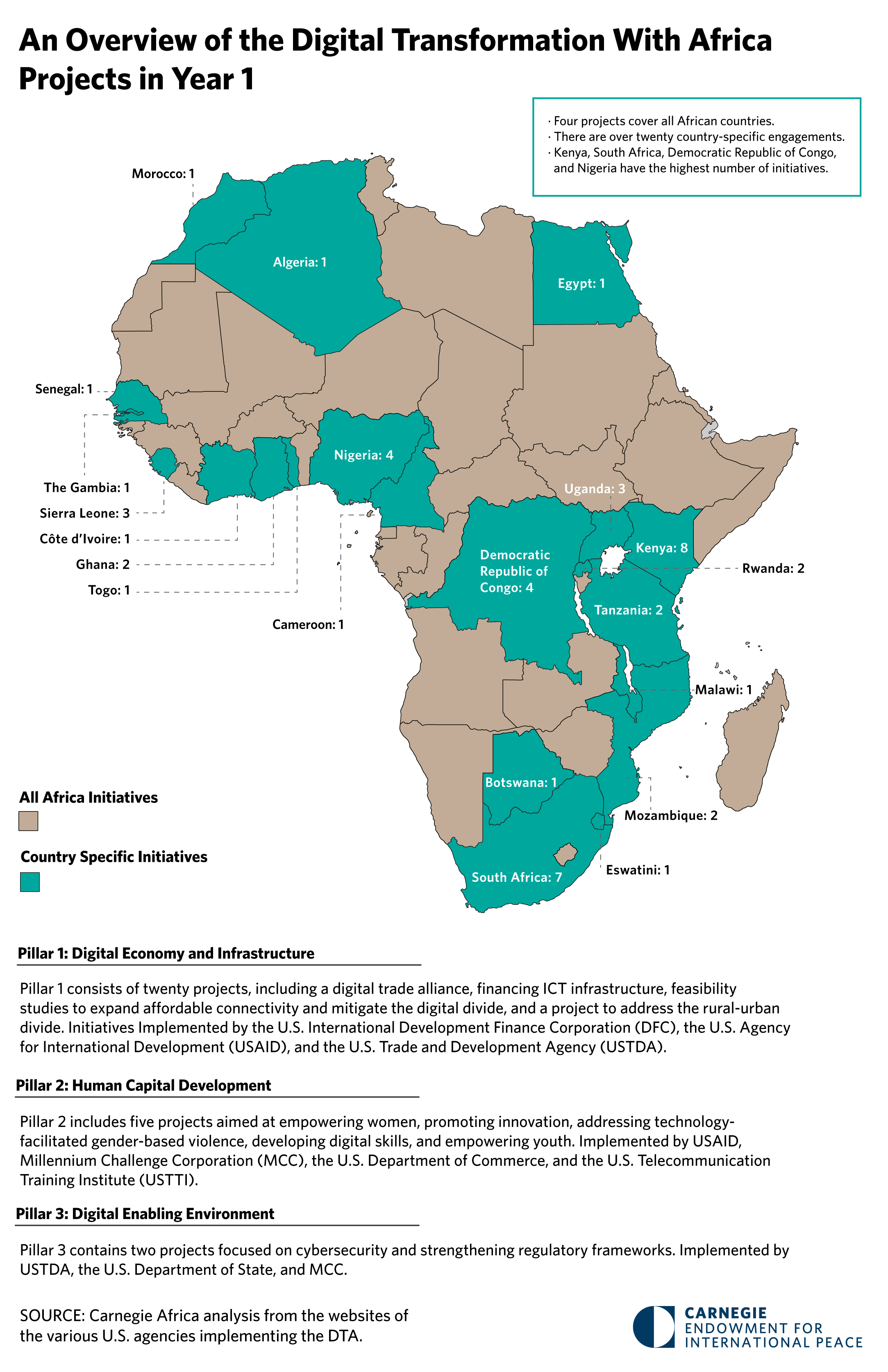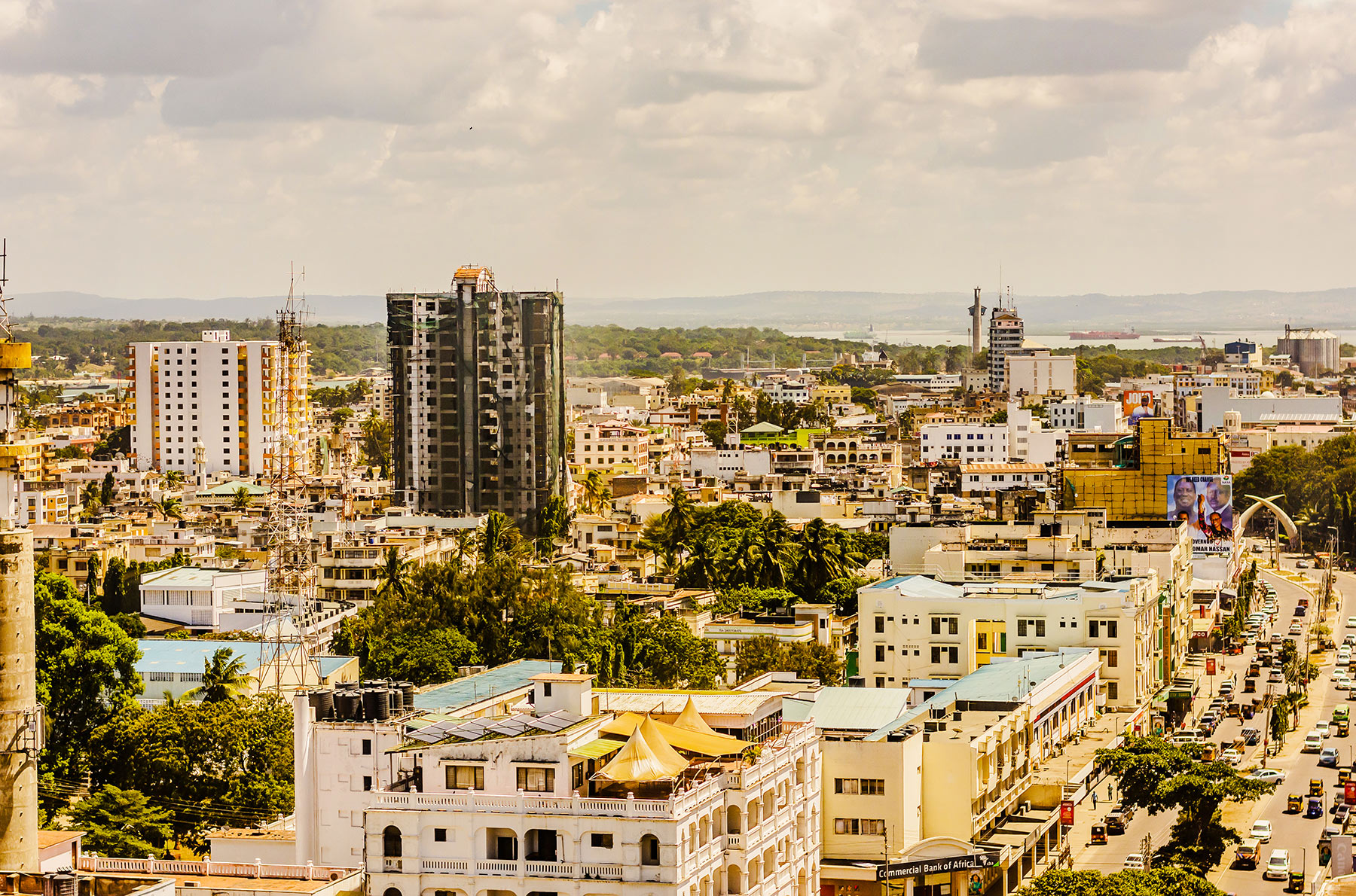MARCH 2024
Dear Friends,
This month, we are highlighting our work on digital transformation in Africa. Jane Munga, the Africa Program's lead on tech policy in Africa has been tracking the progress of the Digital Transformation with Africa (DTA) initiative, which was launched as part of the 2022 U.S.-Africa Leaders' Summit. DTA includes $800 million in investment opportunities to accelerate digital transformation in Africa. In December 2023, the Carnegie Africa Program invited U.S. government representatives, business associations, and African stakeholders to a discussion to take stock of progress made in advancing the initiative one year after its inception.
Our Chart of the Month, below, draws from an analysis written by Jane and Ebelechukwu Monye that maps out DTA’s engagements across its three main pillars. Although four projects cover all African countries, Kenya, South Africa, the Democratic Republic of the Congo, and Nigeria have the highest number of initiatives. In other news from our tech work, Jane was invited to the inaugural World Bank Digital Summit on March 5th, where she participated in a discussion on “Shaping a Decade of Digital Inclusion: Access, Affordability, and Internet for All.” Jane provided insights on the nuances of the digital divide and policy considerations to accelerate inclusion.
On our radar this month is the evolving U.S.-Zimbabwe relationship. On March 4, the Biden administration issued an executive order terminating the national emergency status of Zimbabwe that had been in place since 2003. The executive order noted that the United States would instead use more targeted sanctions under the Global Magnitsky Sanctions program. It designated three entities and eleven individuals, including President Emmerson Mnangagwa and Vice President Constantino Chiwenga, for their involvement in “corruption” and “serious human rights abuses.” The United States first declared a national emergency with respect to Zimbabwe in 2003, with the Bush administration describing a “deliberate breakdown in rule of law” and Zimbabwe’s “democratic processes.” This recent move by the Biden administration to trade one set of broad sanctions with a more targeted type under the Magnitsky program will no doubt have an impact on Zimbabwe and the surrounding region.
We are also tracking the travails of some African countries with their currency exchange rates. The value of the Nigerian currency, the naira, has declined sharply, with Bloomberg reporting that inflation reached a twenty-eight-year-high in January 2024. Rising inflation has led to increased prices of food staples, creating a crisis in a country where 14 percent of its population suffered from food insecurity in the past year. In case you missed it, our research analyst Ebelechukwu provided analysis on Nigeria’s naira redesign policy and how it can be restructured to meet its objectives. At the beginning of March, Egypt signed an expanded $8 billion deal with the IMF as part of a move to lower its national budget deficit. The deal would allow for a more flexible currency exchange rate of the Egyptian pound and to restore foreign investor confidence. Egypt’s deal with the IMF follows a steep increase in inflation and a devaluation of its currency by more than 38 percent. In addition, Egypt has secured a $35 billion investment deal with the United Arab Emirates and $3 billion in funding from the World Bank, with the European Union expected to announce its support package soon.
The Africa Program is gearing up for a busy spring. On March 19, we’ll be hosting South African Minister of Foreign Affairs Dr. Naledi Pandor for a fireside chat to discuss the state of U.S.–South Africa relations. The discussion will touch on recent developments in the bilateral relationship, including conversations surrounding the reauthorization of African Growth and Opportunity Act (AGOA), South Africa’s case against Israel at the International Court of Justice, and the recent “U.S.-South Africa Bilateral Relations Review Act” introduced in the U.S. Congress. On March 27, we will host a conversation with London School of Economics Professor David Luke focused on the trade relationship between the United States and Africa. The discussion will integrate analysis from Luke's book, How Africa Trades, to present data-driven recommendations for thinking about the future of U.S.-Africa trade relations, including AGOA. Later this month, be on the lookout for analysis on the political situation in Senegal, including its recent election delay.
Finally, this week I traveled to Miami, Florida, to attend the Aspen Ideas: Climate Festival, where I spoke on a panel titled “The Global Promise of the U.S. Climate Agenda.” The discussion centered on the global climate impact of the Biden administration’s Inflation Reduction Act thus far, and how it can better support global decarbonization efforts in Africa, India, and the Global South generally.
The Africa Program has exciting developments to come in the following months. To stay up to date on our publications and programming, be sure to subscribe to our newsletter, and follow us on X, formerly known as Twitter, @AfricaCarnegie.
Sincerely,
Zainab Usman
Director, Carnegie Africa Program
CHART OF THE MONTH
Our Chart of the Month, below, provides an overview of Digital Transformation with Africa projects in its first year, based on analysis by our fellow Jane Munga and research analyst Ebelechukwu Monye.

Chart of the Month
FEATURES
Tracking progress of the U.S. Digital Transformation with Africa Initiative, one year after its inception. Jane Munga & Ebelechukwu Monye
The redesign policy for Nigeria’s currency, the naira, still hasn't met its objectives. However, the policy still has a chance for success if policymakers consider several recommendations. Ebelechukwu Monye
Our nonresident scholar Folashade Soulé joined the China Global South Project's China in Africa podcast for a discussion on Africa's digital sovereignty in the era of U.S.-China great power competition. Folashade Soulé
Recommendations from a high-level roundtable on an African agenda for World Bank reform hosted by the Carnegie Africa Program and the African Climate Foundation. Zainab Usman, Ebelechukwu Monye, Aline Abayo, & Andrew Danik
DEVELOPMENTS ON OUR RADAR
- Washington Wants to Revive a Critical Minerals Mega Railway Through Africa [Foreign Policy]
- U.S. Sanctions Zimbabwe Through Flagship Global Magnitsky Sanctions Program [The White House]
- President Ruto, Haiti PM Ariel Henry seal police deployment deal [The EastAfrican]
- Rwanda's President agrees to Felix Tshisekedi over eastern Congo crisis [africanews]
- Nigeria's Deepening Cost-of-Living Crisis is Turning Deadly [Bloomberg]

Chart of the Month
